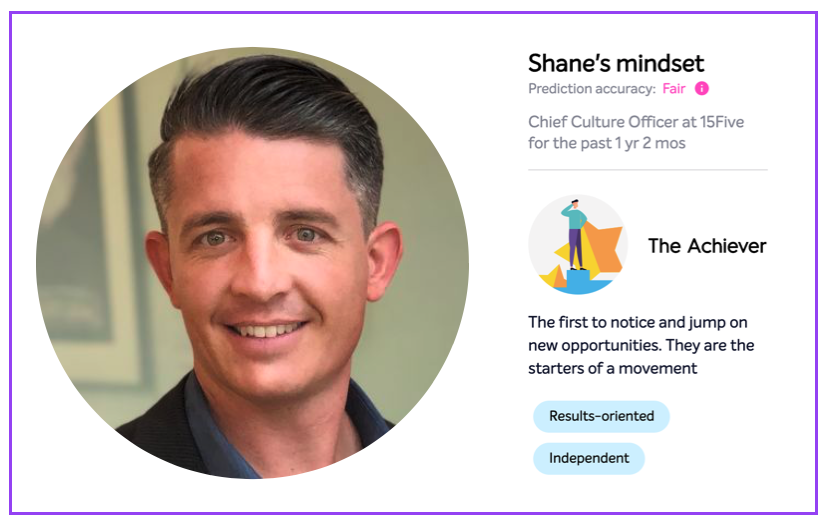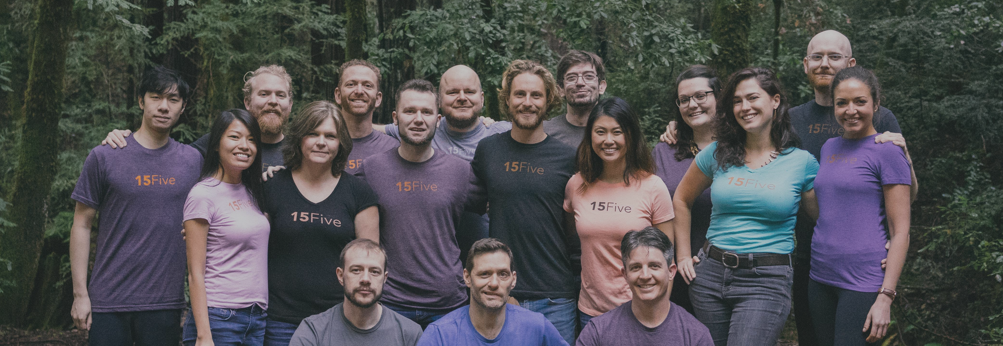For this edition of CULTURED, we had the amazing opportunity to reflect with Shane Metcalf, Co-Founder and Chief Culture Officer of 15five, about work-life balance in fast-growing companies, manager development, the responsibility of managers towards their teams, meditation and mental health, and to work in companies that make you feel and be better every single day.
All this advice comes from a People Leader of a company that had only 5 departures in the last 8 years – so we say: sit back, read attentively, learn and digest this 15-course gourmet dinner by a 5-star Culture chef!

CULTURED: It’s already been 8 years since you co-founded 15five; tell us a bit about your professional background and what brought you into the performance management & employee feedback work.
I’ve had a very nonlinear career and done a lot of different things before starting 15Five. However, the most relevant experience that led me to co-found the company was the five years I was an executive coach.
When I became a coach, I felt I had found something that felt like an amazing way to synthesize all of my different gifts and studies—and I loved it! Before setting shop as a coach, I went through all of this transformational learning, facilitation training, and even studied organizational health and design, psychology, human relationships, communication, feedback—the works.
During this time, I coached a bunch of different startups, and what I loved most about that was understanding organizational health, and how to build healthy companies. Not just smart companies, or companies that can do the technical performance, write the code, and come up with good ideas, but companies that are healthy.
And by health, I’m talking about high levels of trust, vulnerability, connection, and transparency, and all the things that make relationships thrive. That’s what really fascinated me.
One of the things that stuck with me the most was how fragile startups are at the beginning. I’ve facilitated half a dozen founder divorces where they were at each others’ necks and things were quickly devolving, and business suffering as a result. Then I would come in to facilitate and coach them back into either a good separation or getting back into harmony with each other.
And I love that because, fundamentally, business is relationships.
If you want to get good at business, you have to get good at relationships, and at understanding other people: being empathetic, understanding their motives and what drives them, and the subtle emotional triggers that derail a productive relationship and how to recover from them.
So, when my co-founder presented me with the possibility of joining 15five and building this company together, it was so appealing. It was an opportunity to take all the work I was doing on a manual basis, on a dozen other companies, and scale this to help around 2,000 companies using us right now. It was a chance to take my passion for communication, feedback, manager development, and use questions to spark better dialog and achieve better results.
What ultimately led me to 15five was this path of personal development and transformational work.
CULTURED: Tell us a bit about how your typical day looks like and about your focus.
We always want to be pushing the envelope internally and build the most human organization on the planet. The things that we do internally with our culture find their way into the product, influencing all our customers. I feel really privileged about this but, in a way, the stakes are higher because it’s not just about managing our internal culture, it’s really saying, “We need to be a model for the rest of the world”, as well as how to get culture right.
A lot of what I do is continually reminding the entire company that everybody is a Chief Culture Officer.
Culture is not something dictated from me down to the masses. My job is to ensure we’re creating an environment where people understand that they have accountability for their experience here and that they have permission to express themselves.
In a sense, my job is also to ensure that we don’t slip into a culture of fear. And aside from that, on a practical level, I’m managing our own instance of 15five and asking new questions every week, and thinking “what’s the unique question that I’m going to ask the whole company?”
Basically, my role here is to start conversations, to ask the right questions to the whole company so that we can collectively inquire into our own experience and come up with better ideas to our biggest challenges.
A lot of my attention right now is aimed at building systems and processes and then finding the right people to carry those on while I continue to look into what’s next. For example, right now, we’re growing really fast. We have funding, and we’re doubling our headcount every year. So, what I need to do is to make sure the foundational things are in place in order to bring the next hundred people we hire, then have them integrated and contributing to the culture.
And the best thing that we can do right now is to ensure we’re putting a lot of attention on manager development. A manager is going to have a disproportionate impact on the experience of each employee compared to anything I can do.
We can have amazing universal culture, but if someone’s a crappy manager and doesn’t really do the things to help the employees become their best selves, then we’re going to fall short.
Still, at 15five, each person has 100% accountability to become the best versions of themselves, but that’s in the wheelhouse of the manager’s responsibility. So my job is to craft experiences and facilitate processes that allow each manager to embark on a journey to become their best self in tandem with their employees. That’s for me manager development at its best.
Fundamentally, this is what we believe that great culture does; it helps your people be and become their best selves. That’s how a company realizes its full potential and how you build an extraordinary culture. When your people are on this journey of self-realization, you’ll hit your numbers, and out-innovate the competition.
A person in our company once told me, “Wow, I didn’t know that having a job doesn’t necessarily mean spiritual suicide.” And here you can substitute spiritual for psychological, or personal development because business is about paving a viable path for self-actualization. Every person that joins us will eventually leave 15five as happier, more fulfilled, more self-aware, competent, and capable individuals. That’s our goal.
CULTURED: That sounds incredible! With all that you’ve already accomplished, what does the rest of 2019 still have in store for you?
One of the exciting things we’re talking about is the idea of self-management. We’re spreading the message that you can use the science of human thriving to unlock the potential of your people.
The science of human thriving revolves around the research that comes from positive psychology and organizations like the “Positive Business Institute” of the University of Michigan. All of this incredible research suggests that if you fulfill the basic human needs, you are going to help people cultivate a deeper sense of belonging and a greater sense of esteem.
This is where it gets really exciting because, all of a sudden, unlimited growth occurs. We started a podcast about this; we’re giving talks; we’re working on a book deal around this concept, and what’s really thrilling is that we’re integrating a lot more of it directly into the product. Right now, we have an amazing platform for continuous feedback, goal setting, peer recognition, but it also allows us to be more deliberate and explicit about how you use 15five to unlock the potential of your people.
Since we’re scaling, there are larger financial numbers that add pressure, and we basically have more to do than ever. In a process like this, the most obvious course of action would be to use our economic growth to pressure employees into higher performance. However, we also want to devise ways to help people to stay connected and to create a sense of purpose and play in their work, even as the pressure increases.
This is an exciting challenge because it not only considers the process of hypergrowth, but it also deals with the subject of increasing and leveraging our own skills.
I also recently introduced a mindfulness program into the company through an app called Meditation.live, and this is an amazing way to bring in live meditation teachers to each employee. Everyone has access to the best meditation teachers in the world—and not just through recordings, but through live classes.
By introducing these resources as pressure grows, there’s also the counterbalances of self-care ensuring people don’t burn out. At the very least, they’ll experience more centeredness, clarity, and positive states of mind that they’ve ever had before.
Working in companies like ours is comparable to running a marathon where you’re sprinting all the time, but you have to remember to stop and sleep eight hours a day. You can’t constantly be going. Rest and recovery are more essential now than we’ve ever known.
There’s an amazing book called “Why We Sleep” that has some of the most profound research on the vital importance of sleep for high performance. Part of my job is to ensure that we don’t romanticize the idea of sleeping five hours a night because you’re a star worker and you just “crush” it without sleep. That’s a plain, stone-faced lie.
We need to take care of ourselves while healing and clearing trauma out of our systems, not become further traumatized by jerk bosses and unrealistic work demands.
Raj Sisodia, one of the co-founders of “Conscious Capitalism”, talks about this idea of a healing organization where we become more psychologically whole and well-integrated as a result of working in this environment. Something that’s become a large inspiration for me is how to become a healing organization, where you don’t become a more jaded, cynical, burned-out, depressed, unhealthy, sick person, but all the opposite.
CULTURED: So tell us, how did you get to be the People leader that you are today? In your opinion, what were the pivotal moments that lead you down this path?
I think what prepares me to do what I do is that I put hundreds, if not thousands of hours into personal and manager development work, and I believe every leader needs to do the same. Anyone that hopes to create a healthy organization needs to do their own inner work. I don’t care if you go to a therapist, or go to drink ayahuasca in the Amazon, you need to work on yourself.
Organizations are a representation of the worldly views and consciousness of their leaders. If a founder has a ton of unresolved childhood traumas, that’s going to show up in their leadership style—it’s just how it works. The best thing that any people leader can do is to work on themselves; to work with someone who knows ideograms, or human design, or the gene keys, or attachment styles and better understand their strengths.
Once you start to understand your own strengths and just how diverse, varied, and nuanced each person is, it really helps you to get the best performance out of anybody.
In my case, by doing my own shadow work and healing my own issues on this endless journey, I’ve developed a lot more compassion for other people. I’ve gone through really intense things in my life, so having an attitude of gratitude for my own process makes compassion a second nature for dealing with people.
I think that one of the biggest things missing from many companies is the compassion for our own struggles, which include problems with self-esteem, issues with insecurities, arrogance, and all the difficulties that these create for everyone.
Compassionate leadership, where you can see people as whole human beings, creates a culture where that same human being is welcome, can be self-expressed and feels valued, that’s when culture truly thrives.
That’s why we have a 5.0 on GlassDoor, and why 97% of our employees feel that they’ve become better people for working here. Did you know that only around five people have left 15Five in the past eight years? And of the ones who’ve left, it’s because they want to follow their dreams and had nothing to do with actual dissatisfaction.
CULTURED: That’s a mindblowing stat! Could you share with us what excites you and what worries you about People Analytics going forward?
What excites me is that we’re giving more control and power to the individual employees. We’re moving out of the command & control model of leadership, and into a more bottoms-up collaborative model.
People Analytics is currently telling us that every person matters. We’re starting to get a glimpse of how people feel, of the internal, invisible emotional states that are difficult to measure, but which also factor into the equation.
Another thing I really like is the emergence of emotional intelligence within these tools. However, what scares me about this is when we try to reduce a human down to data, then it’ll only be about capturing the full essence of a human by looking at a bunch of numbers, which I think will always fail.
Successful People Analytics platforms use data gathered as indicators of how their people are doing and what will help them to do better, but never losing the curiosity about who these people really are, what they really want, and what they’re capable of.
People Analytics can be used for stat ranking, and for finding the bottom 10%, for example. It can also be used to see where people are struggling when they’re not in the right role, and then go through something like job crafting to help them get into the right position and discover a level of competence that they didn’t even know they had.
I think that so much of this data is actually about the context that the leader is approaching the tool with. Am I using this to empower, inspire, and uplift my people, or am I using it to create more emotional pressure, more monitoring, and more punishments to take away autonomy?
That’s the question every people leader has to ask when using People Analytics, definitely.
CULTURED: Which trends in people tech do you think are getting too much attention? Which ones do you think are still untapped?
Building programs that can support mental health inside a company—because mental health is still taboo, and there are a ton of liabilities that come with it. You can’t ask people questions around it, and this is sometimes good because it helps to protect them from disciplinary measures on account of mental illness, but it also prevents you from having the conversation and being more open around supporting people in their struggle.
One of the interesting things here is by creating systems and structures that support people and mental thriving, you can circumnavigate the liability issue by putting more preventive measures in place, like the Meditation.live initiative I mentioned before. I’m a huge fan of technologically-scalable programs to help people grow and develop.
I think that we aren’t getting enough attention on belonging and how we use tech to create more inclusive cultures. In Maslow’s Hierarchy of Needs, belonging is the third tier; we need a deep sense of belonging before we’re able to develop esteem. Really understanding how we can share our own unique stories, feel witnessed, and appreciated is something that is massively under-tapped. One of the easiest, lowest hanging fruits for any company is creating spaces for more of that shared humanity.
It’s probably going to take decades, but we really need to learn that vulnerability is a strength.
By creating a cultural norm where vulnerability is not only OK, but it’s encouraged and safe, and that we’re not punished for telling the truth about what we’re struggling with, we can really get to know our colleagues.
Lastly, I’m also excited about how companies are learning how they can play a big role in helping people to grow and develop into their best selves. It’s the most exciting game in town.
CULTURED: What’s the unpopular opinion that you have about the field of people operations or HR?
We need to stop saying “HR.” Words have power, and when we view people as resources, we reduce them. It’s a destructive term that we need to abandon and move into the 21st century.
CULTURED: That’s a perfect quote to wrap it up, Shane. Thank you so much for sharing your wisdom with us!
—
Thanks for checking out our Expert Series! We publish new interviews regularly with People leaders from Fortune 500 companies, hyper-growth startups, and everything in-between. To stay in the loop, subscribe to our email newsletter here: Beyond the obvious: Hacks for high-performance leaders and teams.




